Résultats de recherche de titre
Articles 1495061 à 1495080 sur 1497515
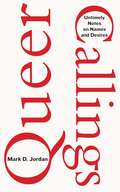
Queer Callings: Untimely Notes on Names and Desires
Par Mark D. Jordan. 2024
CHOICE: OUTSTANDING ACADEMIC TITLEFINALIST, THE RANDY SHILTS AWARD FOR GAY NONFICTION, THE PUBLISHING TRIANGLE AWARDSA passionate exhortation to expand the…
ways we talk about human sex, sexuality, and gender.Twenty-five years ago, Mark D. Jordan published his landmark book on the invention and early history of the category “sodomy,” one that helped to decriminalize certain sexual acts in the United States and to remove the word sodomy from the updated version of a standard English translation of the Christian Bible. In Queer Callings, Jordan extends the same kind of illuminating critical analysis to present uses of “identity” with regard to sexual difference. While the stakes might not seem as high, he acknowledges, his newest history of sexuality is just as vital to a better present and future.Shaking up current conversations that focus on “identity language,” this essential new book seeks to restore queer languages of desire by inviting readers to consider how understandings of “sexual identity” have shifted—and continue to shift—over time. Queer Callings re-reads texts in various genres—literary and political, religious and autobiographical—that have been preoccupied with naming sex/gender diversity beyond a scheme of LGBTQ+ identities. Engaging a wide range of literary and critical works concerned with sex/gender self-understanding in relation to “spirituality,” Jordan takes up the writings of Oscar Wilde, Marcel Proust, Djuna Barnes, Samuel R. Delany, Audre Lorde, Geoff Mains, Eve Kosofsky Sedgwick, Gloria Anzaldúa, Maggie Nelson, and others.Before it’s possible to perceive sexual identities differently, Jordan argues, current habits for classifying them have to be disrupted. In this way, Queer Callings asks us to reach beyond identity language and invites us to re-perform a selection of alternate languages—some from before the invention of phrases like “sexual identity,” others more recent. Tracing a partial genealogy for “sexual identity” and allied phrases, Jordan reveals that the terms are newer than we might imagine. Many queer folk now counted as literary or political ancestors didn’t claim a sexual or gender identity: They didn’t know they were supposed to have one. Finally, Queer Callings joins the writers it has evoked to resist any remaining confidence that it’s possible to give neatly contained accounts of human desire. Reaching into the past to open our eyes to extraordinary opportunities in our present and future, Queer Callings is a generatively destabilizing and essential read.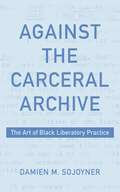
Against the Carceral Archive: The Art of Black Liberatory Practice
Par Damien Sojoyner. 2023
Against the Carceral Archive is a meditation upon what author Damien M. Sojoyner calls the “carceral archival project,” offering a…
distillation of critical, theoretical, and activist work of prison abolitionists over the past three decades. Working from collections at the Southern California Library (Black Panthers, LA Chapter; the Coalition Against Police Abuse; Urban Policy Research Institute; Mothers Reclaiming Our Children; and the collection of geographer Clyde Woods), it builds upon theories of the archive to examine carcerality as the dominant mode of state governance over Black populations in the United States since the 1960s.Each chapter takes up an element of the carceral archive and its destabilization, destruction, and containment of Black life: its notion of the human and the production of “pejorative blackness,” the intimate connection between police and military in the protection of racial capitalism and its fossil fuel–based economy, the role of technology in counterintelligence, and counterinsurgency logics. Importantly, each chapter also emphasizes the carceral archive’s fundamental failure to destroy “Black communal logics” and radical Black forms of knowledge production, both of which contest the carceral archive and create other forms of life in its midst. Concluding with a statement on the reckoning with the radical traditions of thought and being which liberation requires, Sojoyner offers a compelling argument for how the centering of Blackness enables a structuring of the mind that refuses the violent exploitative tendencies of Western epistemological traditions as viable life-affirming practices.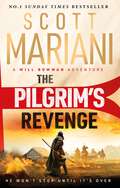
**Pre-order The Knight's Pledge, the second book in the Will Bowman series, now!**1190 - Humble layman Will Bowman lives in…
the countryside with his pregnant wife, when soldiers from Richard Lionheart's army tear through his home. Will is beaten unconscious, and awakes to find his wife murdered, his farm burnt down, and his life forever changed. In vengeance, Will infiltrates Richard's army to find the marauding gang, and finds himself swept along in the march of the Crusades. With the help of new allies and fuelled by his loss, Will crosses Europe with the King's army.Can Will avenge his wife? Or will he be swept away by the unstoppable force of Richard's Crusade?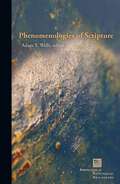
Phenomenologies of Scripture (Perspectives in Continental Philosophy)
Par Adam Y. Wells. 2018
Phenomenologies of Scripture addresses two increasingly convergent disciplines: philosophy and biblical studies. On the one hand, the recent “theological turn”…
in phenomenology has established religion as a legitimate area of phenomenological inquiry. If that turn is to be enduringly successful, phenomenology must pay attention to the scriptures on which religious life, practice, and thought are based. On the other hand, biblical studies finds itself in a methodological morass. Contemporary approaches to scripture have raised important questions about the meaning and function of scriptural texts that phenomenology is uniquely positioned to answer: How is the meaning of a text constructed or gleaned? How can the divine be present in human words? Is a scientific approach to the Bible still possible? Bringing together essays by eight of today’s most prominent philosophers of religion with responses by two leading biblical scholars, Phenomenologies of Scripture reestablishes the possibility of fruitful, dialectical exchange between fields that demand to be read together.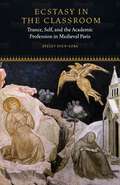
Can ecstatic experiences be studied with the academic instruments of rational investigation? What kinds of religious illumination are experienced by…
academically minded people? And what is the specific nature of the knowledge of God that university theologians of the Middle Ages enjoyed compared with other modes of knowing God, such as rapture, prophecy, the beatific vision, or simple faith? Ecstasy in the Classroom explores the interface between academic theology and ecstatic experience in the first half of the thirteenth century, formative years in the history of the University of Paris, medieval Europe’s “fountain of knowledge.” It considers little-known texts by William of Auxerre, Philip the Chancellor, William of Auvergne, Alexander of Hales, and other theologians of this community, thus creating a group portrait of a scholarly discourse. It seeks to do three things. The first is to map and analyze the scholastic discourse about rapture and other modes of cognition in the first half of the thirteenth century. The second is to explicate the perception of the self that these modes imply: the possibility of transformation and the complex structure of the soul and its habits. The third is to read these discussions as a window on the predicaments of a newborn community of medieval professionals and thereby elucidate foundational tensions in the emergent academic culture and its social and cultural context. Juxtaposing scholastic questions with scenes of contemporary courtly romances and reading Aristotle’s Analytics alongside hagiographical anecdotes, Ecstasy in the Classroom challenges the often rigid historiographical boundaries between scholastic thought and its institutional and cultural context.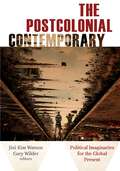
The Postcolonial Contemporary: Political Imaginaries for the Global Present
Par Jini Kim Watson and Gary Wilder, Editors. 2018
This volume invokes the “postcolonial contemporary” in order to recognize and reflect upon the emphatically postcolonial character of the contemporary…
conjuncture, as well as to inquire into whether postcolonial criticism can adequately grasp it. Neither simply for nor against postcolonialism, the volume seeks to cut across this false alternative, and to think with postcolonial theory about political contemporaneity.Many of the most influential frameworks of postcolonial theory were developed during the 1970s and 1990s, during what we may now recognize as the twilight of the postwar period. If forms of capitalist imperialism are entering into new configurations of neoliberal privatization, wars-without-end, xenophobic nationalism and unsustainable extraction, what aspects of postcolonial inquiry must be reworked or revised in order to grasp our political present?In twelve essays that draw from a number of disciplines—history, anthropology, literature, geography, indigenous studies— and regional locations (the Black Atlantic, South Africa, South Asia, East Asia, Australia, Argentina) The Postcolonial Contemporary seeks to move beyond the habitual oppositions that have often characterized the field, such as universal vs. particular; Marxism vs. postcolonialism; and politics vs. culture. These essays signal an attempt to reckon with new and persisting postcolonial predicaments and do so under four inter-related analytics: Postcolonial Temporality; Deprovincializing the Global South; Beyond Marxism versus Postcolonial Studies; and Postcolonial Spatiality and New Political Imaginaries.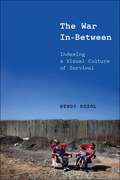
The War In-Between: Indexing a Visual Culture of Survival
Par Wendy Kozol. 2024
Explores the ambiguities and contradictions that disrupt the assumed boundaries of battle zonesAgainst the fabric of suffering that unfolds around…
more spectacular injuries and deaths, The War In-Between studies visual depictions of banal, routine, or inscrutable aspects of militarized violence. Spaces of the in-between are both broader and much less visible than battlefields, even though struggles for survival arise out of the same conditions of structural violence. Visual artifacts including photographs, video, data visualizations, fabric art, and craft projects provide different vantage points on the quotidian impacts of militarism, whether it is the banality of everyday violence for non-combatants or the daily struggles of soldiers living with physical and emotional trauma.Three interrelated concepts frame the book’s attempt to “stay” in the moment of looking at visual cultures of survival. First, the concept of the war in-between captures those interstitial spaces of war where violence and survival persist side-by-side. Second, this book expands the concept of indexicality to consider how images of the in-between rely on a range of indexical traces to produce alternative visualities about survival and endurance. Third, the book introduces an asymptotic analysis to explore the value in getting close to the diverse experiences that comprise the war in-between, even if the horizon line of experience is always just out of reach.Exploring the capaciousness of survival reveals that there is more to feel and engage in war images than just mangled bodies, collapsing buildings, and industrialized death. The War In-Between, Kozol argues, offers not a better truth about war but an accounting of visualities that arise at the otherwise unthinkable junction of conflict and survival.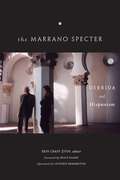
The Marrano Specter: Derrida and Hispanism
Par Erin Graff Zivin. 2018
The Marrano Specter pursues the reciprocal influence between Jacques Derrida and Hispanism. On the one hand, Derrida’s work has engendered…
a robust conversation among philosophers and critics in Spain and Latin America, where his work circulates in excellent translation, and where many of the terms and problems he addresses take on a distinctive meaning: nationalism and cosmopolitanism; spectrality and hauntology; the relation of subjectivity and truth; the university; disciplinarity; institutionality.Perhaps more remarkably, the influence is in a profound sense reciprocal: across his writings, Derrida grapples with the theme of marranismo, the phenomenon of Sephardic crypto-Judaism. Derrida’s marranismo is a means of taking apart traditional accounts of identity; a way for Derrida to reflect on the status of the secret; a philosophical nexus where language, nationalism, and truth-telling meet and clash in productive ways; and a way of elaborating a critique of modern biopolitics. It is much more than a simple marker of his work’s Hispanic identity, but it is also, and irreducibly, that.The essays collected in The Marrano Specter cut across the grain of traditional Hispanism, but also of the humanistic disciplines broadly conceived. Their vantage point—the theoretical, philosophically inflected critique of disciplinary practices—poses uncomfortable, often unfamiliar questions for both hispanophone studies and the broader theoretical humanities.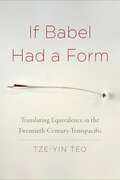
If Babel Had a Form: Translating Equivalence in the Twentieth-Century Transpacific
Par Tze-Yin Teo. 2022
“The likeness of form between Chinese and English sentences,” writes the American Sinologist Ernest Fenollosa around 1906, “renders translation from…
one to the other exceptionally easy.” If Babel Had a Form asks not if his claim may be true, but what its phantasmic surprise may yet do. In twentieth-century intersections of China and Asia with the United States, translations did more than communicate meaning across politicized and racializing differences of language and nation. Transpacific translation breached the regulative protocols that created those very differences of human value and cultural meaning. The result, Tze-Yin Teo argues, saw translators cleaving to the sounds and shapes of poetry to imagine a translingual “likeness of form” but not of meaning or kind.At stake in this form without meaning is a startling new task of equivalence. As a concept, equivalence has been rejected for its colonizing epistemology of value, naming a broken promise of translation and false premise of comparison. Yet the writers studied in this book veered from those ways of knowing to theorize a poetic equivalence: negating the colonial foundations of the concept, they ignited aporias of meaning into flashpoints for a radical literary translation. The book’s transpacific readings glean those forms of equivalence from the writing of Fenollosa, the vernacular experiments of Boxer Scholar Hu Shi, the trilingual musings of Shanghai-born Los Angeles novelist Eileen Chang, the minor work of the Bay Area Korean American transmedial artist Theresa Cha, and a post-Tiananmen elegy by the exiled dissident Yang Lian. The conclusion returns to the deconstructive genealogy of recent debates on translation and untranslatability, displacing the axiom of radical alterity for a no less radical equivalence that remains—pace Fenollosa—far from easy or exceptional.Ultimately, If Babel Had a Form illuminates the demanding force of even the slightest sameness entangled in the translator’s work of remaking our differences.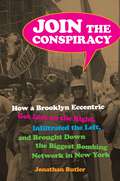
Dive into the electrifying tale of a Brooklyn-born patriot turned radical activist, in an era when America was torn by…
its ideological extremesIn the shadow of recent turmoil, Join the Conspiracy transports readers to a pivotal moment of division and dissent in American history: the late 1960s. Against the backdrop of the Vietnam War and a nation grappling with internal conflict, this compelling narrative follows the life of George Demmerle, a factory worker whose political odyssey encapsulates the era’s tumultuous spirit. From his roots as a concerned citizen wary of his country’s leftward tilt, Demmerle’s journey takes a dramatic turn as he delves into the heart of radical activism. Participating in iconic protests from the March on Washington to the Democratic National Convention in Chicago, Demmerle’s story is a whirlwind of political fervor, embodying the struggle against what was perceived as imperialist war and racial injustice. His transformation is marked by alliances with key figures of the time, including Abbie Hoffman, and an eventual leadership role within an East Coast Black Panther affiliate. Yet, beneath his radical veneer lies a secret: Demmerle is an FBI informant. Join the Conspiracy reveals Demmerle’s complex role in a society at war with itself, where his deepening involvement with the radical left and a bombing collective forces him to confront his loyalties. The narrative, enriched by a rare trove of period documents, candid photos taken from inside the radical movement, and underground art—more than a hundred of which are included in the book—not only charts Demmerle’s saga but also reflects the broader story of a nation struggling to find its moral compass amidst chaos. As Demmerle navigates the dangerous waters of political extremism, readers are invited to ponder the price of ideology, the nature of loyalty, and the fine line between activism and betrayal. This book is not just a recounting of historical events but a vibrant portrait of a man and a movement that sought to reshape America.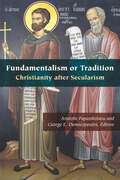
Fundamentalism or Tradition: Christianity after Secularism (Orthodox Christianity and Contemporary Thought)
Par Aristotle Papanikolaou and George E. Demacopoulos. 2020
Traditional, secular, and fundamentalist—all three categories are contested, yet in their contestation they shape our sensibilities and are mutually implicated,…
the one with the others. This interplay brings to the foreground more than ever the question of what it means to think and live as Tradition. The Orthodox theologians of the twentieth century, in particular, have emphasized Tradition not as a dead letter but as a living presence of the Holy Spirit. But how can we discern Tradition as living discernment from fundamentalism? What does it mean to live in Tradition when surrounded by something like the “secular”? These essays interrogate these mutual implications, beginning from the understanding that whatever secular or fundamentalist may mean, they are not Tradition, which is historical, particularistic, in motion, ambiguous and pluralistic, but simultaneously not relativistic.Contributors: R. Scott Appleby, Nikolaos Asproulis, Brandon Gallaher, Paul J. Griffiths, Vigen Guroian, Dellas Oliver Herbel, Edith M. Humphrey, Slavica Jakelić, Nadieszda Kizenko, Wendy Mayer, Brenna Moore, Graham Ward, Darlene Fozard Weaver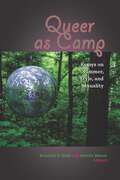
Queer as Camp: Essays on Summer, Style, and Sexuality
Par Kenneth B. Kidd, Derritt Mason. 2019
Named the #1 Bestselling Non-Fiction Title by the Calgary HeraldTo camp means to occupy a place and/or time provisionally or…
under special circumstances. To camp can also mean to queer. And for many children and young adults, summer camp is a formative experience mixed with homosocial structure and homoerotic longing. In Queer as Camp, editors Kenneth B. Kidd and Derritt Mason curate a collection of essays and critical memoirs exploring the intersections of “queer” and “camp,” focusing especially on camp as an alternative and potentially nonnormative place and/or time. Exploring questions of identity, desire, and social formation, Queer as Camp delves into the diverse and queer-enabling dimensions of particular camp/sites, from traditional iterations of camp to camp-like ventures, literary and filmic texts about camp across a range of genres (fantasy, horror, realistic fiction, graphic novels), as well as the notorious appropriation of Indigenous life and the consequences of “playing Indian.” These accessible, engaging essays examine, variously, camp as a queer place and/or the experiences of queers at camp, including Vermont’s Indian Brook, a single-sex girls’ camp that has struggled with the inclusion of nonbinary and transgender campers and staff; the role of Jewish summer camp as a complicated site of sexuality, social bonding, and citizen-making as well as a potentially if not routinely queer-affirming place. They also attend to cinematic and literary representations of camp, such as the Eisner award-winning comic series Lumberjanes, which revitalizes and revises the century-old Girl Scout story; Disney’s Paul Bunyan, a short film that plays up male homosociality and cross-species bonding while inviting queer identification in the process; Sleepaway Camp, a horror film that exposes and deconstructs anxieties about the gendered body; and Wes Anderson’s critically acclaimed Moonrise Kingdom, which evokes dreams of escape, transformation, and other ways of being in the world. Highly interdisciplinary in scope, Queer as Camp reflects on camp and Camp with candor, insight, and often humor. Contributors: Kyle Eveleth, D. Gilson, Charlie Hailey, Ana M. Jimenez-Moreno, Kathryn R. Kent, Mark Lipton, Kerry Mallan, Chris McGee, Roderick McGillis, Tammy Mielke, Alexis Mitchell, Flavia Musinsky, Daniel Mallory Ortberg, Annebella Pollen, Andrew J. Trevarrow, Paul Venzo, Joshua Whitehead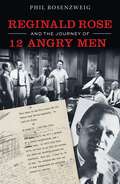
Reginald Rose and the Journey of 12 Angry Men
Par Phil Rosenzweig. 2021
Finalist, 2021 Wall Award (Formerly the Theatre Library Association Award)The untold story behind one of America’s greatest dramasIn early 1957,…
a low-budget black-and-white movie opened across the United States. Consisting of little more than a dozen men arguing in a dingy room, it was a failure at the box office and soon faded from view.Today, 12 Angry Men is acclaimed as a movie classic, revered by the critics, beloved by the public, and widely performed as a stage play, touching audiences around the world. It is also a favorite of the legal profession for its portrayal of ordinary citizens reaching a just verdict and widely taught for its depiction of group dynamics and human relations. Few twentieth-century American dramatic works have had the acclaim and impact of 12 Angry Men.Reginald Rose and the Journey of “12 Angry Men” tells two stories: the life of a great writer and the journey of his most famous work, one that ultimately outshined its author. More than any writer in the Golden Age of Television, Reginald Rose took up vital social issues of the day—from racial prejudice to juvenile delinquency to civil liberties—and made them accessible to a wide audience. His 1960s series, The Defenders, was the finest drama of its age and set the standard for legal dramas. This book brings Reginald Rose’s long and successful career, its origins and accomplishments, into view at long last.By placing 12 Angry Men in its historical and social context—the rise of television, the blacklist, and the struggle for civil rights—author Phil Rosenzweig traces the story of this brilliant courtroom drama, beginning with the chance experience that inspired Rose, to its performance on CBS’s Westinghouse Studio One in 1954, to the feature film with Henry Fonda. The book describes Sidney Lumet’s casting, the sudden death of one actor, and the contribution of cinematographer Boris Kaufman. It explores the various drafts of the drama, with characters modified and scenes added and deleted, with Rose settling on the shattering climax only days before filming began.Drawing on extensive research and brimming with insight, this book casts new light on one of America’s great dramas—and about its author, a man of immense talent and courage.Author royalties will be donated equally to the Feerick Center for Social Justice at Fordham Law School and the Justice John Paul Stevens Jury Center at Chicago-Kent College of Law.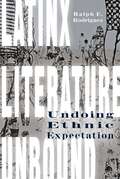
Latinx Literature Unbound: Undoing Ethnic Expectation
Par Ralph E. Rodriguez. 2018
Since the 1990s, there has been unparalleled growth in the literary output from an ever more diverse group of Latinx…
writers. Extant criticism, however, has yet to catch up with the diversity of writers we label Latinx and the range of themes about which they write. Little sustained scholarly attention has been paid, moreover, to the very category under which we group this literature. Latinx Literature Unbound, thus, begins with a fundamental question “What does it mean to label a work of literature or an entire corpus of literature Latinx?” From this question others emerge: What does Latinx allow or predispose us to see, and what does it preclude us from seeing? If the grouping—which brings together a heterogeneous collection of people under a seemingly homogeneous label—tells us something meaningful, is there a poetics we can develop that would facilitate our analysis of this literature?In answering these questions, Latinx Literature Unbound frees Latinx literature from taken-for-granted critical assumptions about identity and theme. It argues that there may be more salubrious taxonomies than Latinx for organizing and analyzing this literature. Privileging the act of reading as a temporal, meaning-making event, Ralph E. Rodriguez argues that genre may be a more durable category for analyzing this literature and suggests new ways we might proceed with future studies of the writing we have come to identify as Latinx.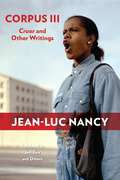
Corpus III: Cruor and Other Writings
Par Jean-Luc Nancy. 2023
A beautiful, profound series of reflections on the body by one of the most prominent and consequential philosophers of continental…
EuropeThis landmark volume brings into English Jean-Luc Nancy’s last completed work and concludes his remarkable philosophical reflections on the body, a project he began almost thirty years ago. Taking the body as an intersection of pulsing life and destructive cruelty on a global scale, Nancy’s account becomes more vivid, more physical, than ever, even as it ventures into language that is as lyrical as it is profound. This vividness is manifest in blood: as it flows, in all its pulsing and forceful circulation, and as it spills, in the cruelty of existences confronted daily by countless destructions. This can be described as sanguis and cruor, the two Latin words for blood’s intermingled but distinct aspects. This distinction allows Nancy to highlight an almost mystical sense of the body (yet one that remains soberly on this side of its manifest insistence), alongside the cruelty that pervades our world—a world whose very existence is threatened by its reduction to mere objects.The exceptional writings brought together in Corpus III comprise a masterful work of philosophy that marries rigorous erudition—on Freud, Nietzsche, and others—with rich poetic language and an actual poem. Nancy’s thought opens the body onto its own unaccountable origins, its plural singularities, its enmeshed instantiations, and its excessive irreducibles, which are also the elusive excesses of language. Whereas in earlier texts Nancy has referred to this excess as poetry, here he performs it in the form of a poem, in the extraordinary hymn entitled Stoma. While the publication of a poem by Nancy is a notable event, equally noteworthy is a remarkable essay entitled “Scandalous Death,” in which Nancy meditated on a subject that was to come to him too soon after. Above all, the book is crucial for bringing into English Cruor, the very last book Nancy completed before his death, an evocative meditation offered by a great thinker on the complex conditions of his own—and our—singular survival.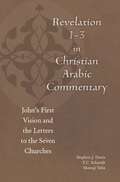
Revelation 1-3 in Christian Arabic Commentary: John's First Vision and the Letters to the Seven Churches (Christian Arabic Texts in Translation)
Par Ibn Kātib Qayṣar, Būlus Al-Būshī. 2019
The first publication in a new series—Christian Arabic Texts in Translation, edited by Stephen Davis—this book presents English-language excerpts from…
thirteenth-century commentaries on the Apocalypse of John by two Egyptian authors, Būlus al-Būshī and Ibn Kātib Qas.ar. Accompanied by scholarly introductions and critical annotations, this edition will provide a valuable entry-point to important but understudied theological work taking place at the at the meeting-points of the medieval Christian and Muslim worlds.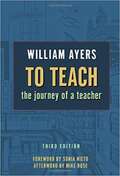
To Teach: The Journey Of A Teacher
Par William Ayers. 2010
To Teach is the now-classic story of one teacher’s odyssey into the ethical and intellectual heart of teaching. For almost…
two decades, it has inspired teachers across the country to follow their own paths, face their own challenges, and become the teachers they long to be. Since the second edition, there have been dramatic shifts to the educational landscape: the rise and fall of NCLB, major federal intervention in education, the Seattle and Louisville Supreme Court decisions, the unprecedented involvement of philanthropic organizations and big city mayors in school reform, the financial crisis, and much more. This new third edition is essential reading amidst today’s public policy debates and school reform initiatives that stress the importance of “good teaching.” To help bring this popular story to a new generation of teachers, Teachers College Press is publishing an exciting companion volume, To Teach: The Journey, in Comics. In this graphic novel, Ayers and talented young artist Ryan Alexander-Tanner bring the celebrated memoir to life. The third edition of To Teach, paired with the new graphic novel, offers a unique teaching and learning experience that broadens and deepens our understanding of what teaching can be. Together, these resources will capture the imaginations of pre- and in-service teachers who are ready to follow their own Yellow Brick Roads. The third edition of To Teach offers today’s teachers: Inspiration to help them reconnect with their highest aspirations and hopes. A practical guide to teaching as a moral practice. An antidote to teaching as a linear, connect-the-dots enterprise. A study guide that is available online at www.tcpress.com.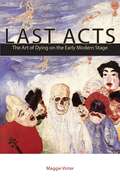
Last Acts: The Art of Dying on the Early Modern Stage
Par Maggie Vinter. 2019
Last Acts argues that the Elizabethan and Jacobean theater offered playwrights, actors, and audiences important opportunities to practice arts of…
dying. Psychoanalytic and new historicist scholars have exhaustively documented the methods that early modern dramatic texts and performances use to memorialize the dead, at times even asserting that theater itself constitutes a form of mourning. But early modern plays also engage with devotional traditions that understand death less as an occasion for suffering or grief than as an action to be performed, well or badly.Active deaths belie narratives of helplessness and loss through which mortality is too often read and instead suggest how marginalized and constrained subjects might participate in the political, social, and economic management of life. Some early modern strategies for dying resonate with descriptions of politicized biological life in the recent work of Giorgio Agamben and Roberto Esposito, or with ecclesiastical forms. Yet the art of dying is not solely a discipline imposed upon recalcitrant subjects. Since it offers suffering individuals a way to enact their deaths on their own terms, it discloses both political and dramatic action in their most minimal manifestations. Rather than mournfully marking what we cannot recover, the practice of dying reveals what we can do, even in death. By analyzing representations of dying in plays by Marlowe, Shakespeare, and Jonson, alongside devotional texts and contemporary biopolitical theory, Last Acts shows how theater reflects, enables, and contests the politicization of life and death.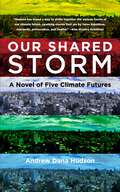
Our Shared Storm: A Novel of Five Climate Futures
Par Andrew Dana Hudson. 2022
Through speculative fiction, five interlocking novelettes explore the possible realities of our climate future.What is the future of our climate?…
Given that our summers now regularly feature Arctic heat waves and wildfire blood skies, polar vortex winters that reach all the way down to Texas, and “100-year” storms that hit every few months, it may seem that catastrophe is a done deal. As grim as things are, however, we still have options. Combining fiction and nonfiction and employing speculative tools for scholarly purposes, Our Shared Storm explores not just one potential climate future but five possible outcomes dependent upon our actions today. Written by speculative-fiction writer and sustainability researcher Andrew Dana Hudson, Our Shared Storm features five overlapping fictions to employ a futurist technique called “scenarios thinking.” Rather than try to predict how history will unfold—picking one out of many unpredictable and contingent branching paths—it instead creates a set of futures that represent major trends or counterposed possibilities, based on a set of climate-modeling scenarios known as the Shared Socioeconomic Pathways (SSPs).The setting is the year 2054, during the Conference of the Parties global climate negotiations (a.k.a., The COP) in Buenos Aires, Argentina. Each story features a common cast of characters, but with events unfolding differently for them—and human society—in each alternate universe. These five scenarios highlight the political, economic, and cultural possibilities of futures where investments in climate adaptation and mitigation promised today have been successfully completed, kicked down the road, or abandoned altogether. From harrowing to hopeful, these stories highlight the choices we must make to stabilize the planet.Our Shared Storm is an experiment in deploying practice-based research methods to explore the opportunities and challenges of using climate fiction to engage scientific and academic frameworks.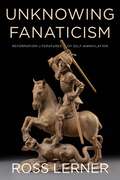
Unknowing Fanaticism: Reformation Literatures of Self-Annihilation
Par Ross Lerner. 2019
We may think we know what defines religious fanaticism: violent action undertaken with dogmatic certainty. But the term fanatic, from…
the European Reformation to today, has never been a stable one. Then and now it has been reductively defined to justify state violence and to delegitimize alternative sources of authority. Unknowing Fanaticism rejects the simplified binary of fanatical religion and rational politics, turning to Renaissance literature to demonstrate that fanaticism was integral to how both modern politics and poetics developed, from the German Peasants’ Revolt to the English Civil War.The book traces two entangled approaches to fanaticism in this long Reformation moment: the targeting of it as an extreme political threat and the engagement with it as a deep epistemological and poetic problem. In the first, thinkers of modernity from Martin Luther to Thomas Hobbes and John Locke positioned themselves against fanaticism to pathologize rebellion and abet theological and political control. In the second, which arose alongside and often in response to the first, the poets of fanaticism investigated the link between fanatical self-annihilation—the process by which one could become a vessel for divine violence—and the practices of writing poetry. Edmund Spenser, John Donne, and John Milton recognized in the fanatic’s claim to be a passive instrument of God their own incapacity to know and depict the origins of fanaticism. Yet this crisis of unknowing was a productive one. It led these writers to experiment with poetic techniques that would allow them to address fanaticism’s tendency to unsettle the boundaries between human and divine agency and between individual and collective bodies. These poets demand a new critical method, which this book attempts to model: a historically-minded and politicized formalism that can attend to the complexity of the poetic encounter with fanaticism.